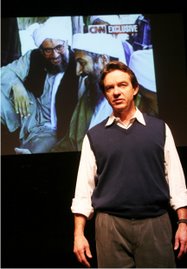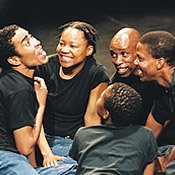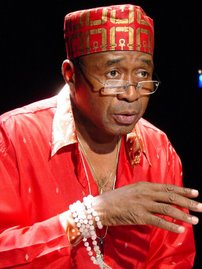Monday, July 2, 2007
Nigerian Oil... Or No Oil, Actually, In São Tomé
Nigerian and American business men buy oil rights in a country with no oil, sell the company for mad money, bribe a Democrat from Louisiana, and somehow Jeff Sachs (The End of Poverty: Economic Possibilities for Our Time) gets to swingin... What a nuts story.
Saturday, June 23, 2007
Tings Happenin, On Stage & Off
But the news isn't waiting a month. Check out two recent BBC stories about Nigeria, one about the mess that its government is fast becoming, the other about oil prices and the strikes they create.
A lot of people don't know that Nigeria is the largest oil-producer in Africa and one of its most populous countries (and few democracies), nor that its oil industry and economy in general are increasingly fucked up, as foreign powers (the US and China) loom, warlords grab power, oil company unions go on strike, and beleaguered politicians and average Nigerians struggle to keep their gars gassed, their dinner plates full, and their heads attached to their bodies.
Tuesday, June 5, 2007
When Shell met Tyranny...
Till then, read some of his fascinating, disturbing insider reports on Nigerian oil evils:
OpenDemocracy.net
Alternet.org
Monday, April 9, 2007
Tuesday, April 3, 2007
US Priorities = Fucked
...should be a huge priority. Easy-to-slow down or stop human rights crises abound. See: Yesterday's post about Central African Republic. Or check out today's NYTimes, "Showing Mugabe the Door," by PETER GODWIN:
Zimbabwe lacks the two exports necessary to interest the United States in direct intervention: oil and terrorism. International sanctions on Zimbabwe are now minuscule. We could ramp up “smart sanctions” against Mr. Mugabe and his coterie, for example by freezing their ill-gotten external assets, but any wider sanctions would probably only hurt those at the bottom of the food chain, not the elite kleptocracy. Megaphone diplomacy tends to feed Mr. Mugabe’s portrayal of Western powers as shrill, hectoring, imperialist bullies.
Long story short: Zimbabwe is the poorest, most messed-up country on the planet. And Democrats and Republicans aren't going to do anything to help the people there.
(Check out Alex Cockburn's perfectly motley, perfectly reasoned discussion of latter-day Radicalism, and why he's not a card-carryin' Dem. Then go out and vote Freak Power Party, when I run for NY Senate...)
2. Iraq
Read George Packard's excellent, excellent discussion of how we treat our own allies--or, rather, how we grossly mistreat our own allies in Iraq.
From the article:
From the hotel window, Othman could see the palace domes of the Green Zone directly across the Tigris River. “It’s sad,” he told me. “With all the hopes that we had, and all the dreams, I was totally against the word ‘invasion.’ Wherever I go, I was defending the Americans and strongly saying, ‘America was here to make a change.’ Now I have my doubts.”
Laith was more blunt: “Sometimes, I feel like we’re standing in line for a ticket, waiting to die.”
3. America
From the NYTimes' "Relatives of Interned Japanese-Americans Side With Muslims," By NINA BERNSTEIN:
In recent years, many scholars have drawn parallels and contrasts between the internment of Japanese-Americans after the attack on Pearl Harbor, and the treatment of hundreds of Muslim noncitizens who were swept up in the weeks after the 2001 terror attacks, then held for months before they were cleared of links to terrorism and deported.
But the brief being filed today is a rare case of members of a third generation stepping up to defend legal protections that were lost to their grandparents, and that their parents devoted their lives to reclaiming.
“I feel that racial profiling is absolutely wrong and unjustifiable,” Ms. Yasui, 53, wrote in an e-mail message from San Miguel de Allende, Mexico, where she works as a writer and graphic designer. “That my grandmother was treated by the U.S. government as a ‘dangerous enemy alien’ was a travesty. And it killed my grandfather.”
Meaning history repeats, because we turn our eyes from it.
4.
We must at least consider--as a nation, from the highest benches of government on down--that the starving, oppressed peoples of Africa might just be worthy of our help, even if such help does not result in any financial or political gain for us. We must consider that we might really have to help them, just because it is the right thing to do. It is the right thing to do in the MLK II/Faulkner/Mos Def sense--the sense that does not take explaining or theorizing or justifying--just doing.
We must consider the fact that, by treating our Iraqi allies in Baghdad badly and replacing them with Jordanians and Uzbeks, we might be harming both the Iraqi people and the American people. We might be placing ourselves at a continually greater risk of terrorist attack by neglecting to follow the advice of the Iraqis who want to help us fix Iraq.
And finally we must treat each and every American citizen as a citizen; in fact, we must treat as citizens even those proto-citizens who are prevented from joining this Union by right wing xenophobics. We must not treat Muslims like terrorists simply because they are Muslims.
Sure, the Quran and Bible and Torah and other religious/doctrinal texts advocate or don't advocate violence against various groups and for various reasons and via various metaphors and with various room for diplomatic out-bowing... But more important than all that hogwashing is the fact that most US Muslims--must Muslims everywhere--aren't "violent" and shouldn't be treated as dangerous outsiders. They pay taxes, watch the Super Bowl and eat at frickin Chucky Cheese, just like everyone else (except Tax Skippin Jimmy) in New Jersey.
Which all leads me to one more short mosaic-piece of information for you to ponder over. O ye who saw Guantánamo: Honorbound to Defend Freedom here at CP, weep! Then stop weeping. Then write your senator, your rep, your local judges, your PTA people, and your President. Just copy the paragraph below and X it out with chicken's blood. (That's called "Bad Bird" houdou.) Anyway, here it is:
5. Sad, Sad Tidings
From the NYTimes' "Supreme Court Denies Guantánamo Appeal," By LINDA GREENHOUSE:
WASHINGTON, April 2 — The Supreme Court on Monday declined to hear urgent appeals from two groups of detainees at Guantánamo Bay. The 45 men sought to challenge the constitutionality of a new law stripping federal judges of the authority to hear challenges to the open-ended confinement of foreign citizens held at the American naval base in Cuba and designated as enemy combatants.
Monday, April 2, 2007
Preventable Tragedies
The crisis in the Central African Republic is now more than two years old, and the fighting has killed thousands of people and caused hundreds of thousands of the country’s four million people to flee their homes.
Their flight has been so desperate that those who can have run across the border into their troubled neighbors’ territory. About 50,000 people from the northwest have fled into southern Chad, and thousands of residents of the northeastern town of Birao, in a perverse twist, have even fled into the Darfur region of Sudan, where a struggle over power, land and identity has raged since 2003.
Toby Lanzer, the United Nations humanitarian chief in the Central African Republic, said that despite the nation’s desperate poverty, saving lives here, with enough resources, would be relatively easy.
Chad and Sudan are vast, arid nations that have complex ethnic problems, and aid workers have been attacked and stymied by government bureaucracy. Sudan and Chad have both refused United Nations peacekeeping troops, but the Central African Republic has said it would cooperate with an international force.
“This is a place where the international community is welcomed,” Mr. Lanzer said. “It is a country of four million people. We should be able to fix this.”
Monday, February 26, 2007
dispatch from Nairobi
This is a bit belated - it's a re-post from a piece I wrote for openDemocracy about the World Social Forum in Kenya, which I attended in my capacity as producer of Women Center Stage, Culture Project's annual multi-disciplinary arts festival focusing on women artists who are calling our attention to issues of social justice globally.
Growing up a young white woman in New York City, my world was comfortable, it was integrated, and my feminism was without a name and assumed. I say with not a small amount of shame that it was only very recently that I understood acutely enough that only for white and privileged women is feminism about reproductive rights, glass ceilings and the stiletto-or-not debate. And I am looking for deeper connections, for wider, meaningful work.
In 2007, there is a palpable paradox: women take leadership positions from Chile to Germany, as women from Ukraine to the Dominican Republic are trafficked into prostitution and the right of women in the United States to sovereignty over their bodies is carefully dismantled. Countries like Mexico and South Africa allow employers to keep women from work due to pregnancy; in Morocco, Kuwait, and Saudi Arabia, women’s legal rights belong to male family members. Each day, in every part of the world, women are beaten in their own homes.
The World Social Forum has made this co-existent diversity and commonality of experience palpable.
Arriving in Kenya, my first trip to any African country, I found myself enraged (at myself? at my schooling?) by how little I know about the world, and even about my own country. I have so little real information, know so little about real people and their experiences. And so I began to understand that my job in Nairobi was to listen.
So I’ve tried to pull out themes that emerged in the sessions I’ve been to:
The first is a call from women in all parts of the world to shake off the limitations implied by our attachment to the language of patriarchy. That, in re-visioning the world, we continue to use and accept assumptions asserted by an old standard. It is within our rights – perhaps our responsibility – to re-work the vocabulary and the assumptions as we work to make change. As a young woman said at a Young Feminists meeting, “we are not just a women’s movement, we are women in movement.”
The second point follows closely: as women in movement, generational disconnects seem to come up again and again. In a youth circle, an older woman thanked younger women for carrying the torch in a long speech, but left the room as soon as younger women began speaking; in a session on women elected leaders, young women lamented a lack of mentorship and begged for more guidance and support; older women observed that younger women don’t seem to have a sense of their history or a tie to any coherent movement. And these things were expressed across barriers of country, ethnicity, socioeconomic status, what-have-you.
A third, related, point is that, as women, we can tend to fight to be in the space we have, rather than fighting to expand the space. Women talked a great deal about competition between one another, and a barrier between generations and classes of women, and called strongly for more solidarity. They brought up, in every session, the importance of “knowing each other better,” learning from each other, and supporting each other – and expanding the space so as to be able to stand together.
Finally, women globally are calling the world’s attention to a wide range of social justice issues in their regions and homes. Women fight side by side with men, and with a unique worldview, in the labor movement, in the environmental movement, in the immigration movement and in countless other struggles of countless other people and communities. The global women’s movement is a call to action for equality and safety for all people, everywhere.
By the closing of the World Social Forum, I felt deeply all the beauty and contradictions of the event. For 7 days, I walked through the most diverse throngs of people I’ve ever seen – people from African countries in tribal dress, people from African countries who would blend in anywhere in the U.S., women in saris, endless types of headdress. I saw a woman in a full burkha, but openly holding hands with the man she was with – no gloves even!
What if the world really looked like this! And of course, it’s a small oasis and not without its problems and complications. Many Kenyans protested the Forum because even the reduced price for them was a day’s wages and not at all affordable. And once we were all safely home, two of these citizens - young boys - were executed for their efforts. Yes, they were executed.
One afternoon, as I was admiring the number of men wearing t-shirts that read “women are not property,” I was approached by a young man from Sierra Leone who wanted to chat. He told me that he works as an anti-mining activist, and we talked about Sierra Leone and the Appalachian coal-mining region in the U.S. And then he said, “I would like to bring you to my country,” to which I replied, “I’d be very interested to see it.” He said, “Yes, you will marry me and come to live in my country.” When I explained that wouldn’t be possible he thought for a moment and then asked if I have a sister. I told him that she is sixteen. “Ah,” he said, dead serious, “the perfect age for marrying. Very obedient. You will give her my picture when you go home.”
But what an extraordinary event this was! I quickly came to relish being in the minority for a period (I’m sure tempered by the fact that it was temporary), reminding myself to listen and not to hold tight to my own views and experience. I loved seeing so many different colored people engaged in real conversations, and to see that there is work going on constantly, at the most local, grassroots level, as well as in global partnerships. As a woman said in the last day's final Women’s Forum, the World Social Forum gives us a moment to take the work we’ve done and put it on the world table. And in the end – to sum up the parts of the whole as best as I can – as we meet and grow in our work, we make another world possible.



